 |
People |
| |
Edgar Galloway, M.D. (1894 – 1982)
Superintendent of Shreveport Charity Hospital/
Confederate Memorial Medical Center |
| |
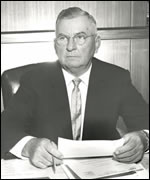 Born in 1894, Dr. Edgar Galloway spent his childhood in Vivian, Louisiana. He then attended Louisiana State University and earned money during the summers working in an oil field. After college, he entered Tulane University School of Medicine, but his education was interrupted when he enlisted in the army to join the forces of the First World War. During this time, he met his future wife, a Red Cross nurse. After returning from war and graduating in 1921, Dr. Galloway interned at Shreveport Charity Hospital because, as he affirmed, “that’s where the work was; that’s where we could learn.” Born in 1894, Dr. Edgar Galloway spent his childhood in Vivian, Louisiana. He then attended Louisiana State University and earned money during the summers working in an oil field. After college, he entered Tulane University School of Medicine, but his education was interrupted when he enlisted in the army to join the forces of the First World War. During this time, he met his future wife, a Red Cross nurse. After returning from war and graduating in 1921, Dr. Galloway interned at Shreveport Charity Hospital because, as he affirmed, “that’s where the work was; that’s where we could learn.”
Dr. Galloway worked in private practice while serving as the Chief of Obstetrics at Shreveport Charity Hospital for almost twenty years before the hospital board appointed him as superintendent in 1940. The hospital was in major disrepair at the time of his appointment. He oversaw many improvements, including installation of a heating system and a new morgue, purchase of new equipment, and the appointment of qualified employees. He also supervised plans to construct a new building for the hospital, but he was unable to oversee the actual construction as newly-elected Governor Earl K. Long removed Galloway from his post in 1948.
He was reappointed as superintendent in 1954 by Governor Robert F. Kennon one year after the new building was constructed and named Confederate Memorial Medical Center. However, this appointment only lasted two years because he was removed yet again by Governor Long in 1956. Then, he was reappointed in 1961 during the term of Governor Jimmie Davis and remained in this position until his retirement in 1972 at the age of 78. Dr. Galloway served as superintendent of the hospital for a total of twenty-two years over three separate periods.
For more information, click here. |
| |
| |
Joe E. Holoubek, M.D. (1915 – 2007)
A Founder of the LSU School of Medicine in Shreveport |
| |
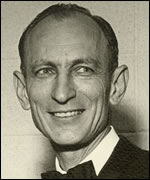 Dr. Joe Holoubek was born in 1915 near Clarkson, Nebraska. He earned both his undergraduate degree and medical degree at the University of Nebraska. Before graduating in 1938, he completed a summer fellowship program at the Mayo Clinic, where he met Alice Baker whom he would later marry. She graduated in 1938 from the Louisiana State University School of Medicine in New Orleans. Dr. Joe Holoubek was born in 1915 near Clarkson, Nebraska. He earned both his undergraduate degree and medical degree at the University of Nebraska. Before graduating in 1938, he completed a summer fellowship program at the Mayo Clinic, where he met Alice Baker whom he would later marry. She graduated in 1938 from the Louisiana State University School of Medicine in New Orleans.
Following their internships, they planned to marry in the summer of 1939. However, they had difficulty being accepted to postgraduate fellowship programs in the same location, so Dr. Edgar Hull, one of Alice’s favorite professors, offered them the only fellowship position available at the LSU School of Medicine in New Orleans. They were both able to work, but they had to share the single salary. They continued to share the position until Dr. Holoubek was called to active duty for World War II. He served at an army hospital in New Orleans but was never sent overseas due to health reasons. After the war, Drs. Joe and Alice Holoubek moved to Shreveport in 1945, where they entered private practice and became actively involved in their community and church.
In 1950, Dr. Joe Holoubek became one of the leaders in promoting the formation of a medical school in Shreveport. He urged local physicians to contact their legislators to support funding for the project. In 1963, he became the chair of a committee to research the development of a medical school. After the School of Medicine was established, both Drs. Joe and Alice Holoubek became visiting faculty members in the Department of Medicine, where he was eventually promoted to Emeritus Clinical Professor. The couple practiced medicine in Shreveport for over forty years. In 2006, the Joe E. Holoubek Professorship in Medicine was established at the LSU School of Medicine in Shreveport. |
| |
| |
Edgar Hull, M.D. (1904 – 1984)
Founding Dean of LSU School of Medicine in Shreveport |
| |
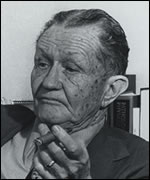 Dr. Edgar Hull was born in Pascagoula, Mississippi in 1904. He attended Louisiana State University in Baton Rouge from 1920 to 1922, and he graduated from Tulane University School of Medicine in 1927. After completing his internship at the Highland Sanitarium in Shreveport, he established a private practice in North Louisiana. Then, in 1931, at the age of 27, Dr. Hull applied for a position as an Instructor of Medicine at the newly-established Louisiana State University School of Medicine in New Orleans. By 1939, he had advanced to the rank of Professor, was named the Head of the Department of Medicine in 1940, and was promoted to Associate Dean of the School of Medicine in 1954. Dr. Edgar Hull was born in Pascagoula, Mississippi in 1904. He attended Louisiana State University in Baton Rouge from 1920 to 1922, and he graduated from Tulane University School of Medicine in 1927. After completing his internship at the Highland Sanitarium in Shreveport, he established a private practice in North Louisiana. Then, in 1931, at the age of 27, Dr. Hull applied for a position as an Instructor of Medicine at the newly-established Louisiana State University School of Medicine in New Orleans. By 1939, he had advanced to the rank of Professor, was named the Head of the Department of Medicine in 1940, and was promoted to Associate Dean of the School of Medicine in 1954.
On May 5th, 1955, Dr. Hull addressed physicians in Shreveport to advocate the formation of a postgraduate medical school in North Louisiana. Soon thereafter, the Department of Postgraduate Medicine at the Confederate Memorial Medical Center was established under the auspices of the LSU School of Medicine in New Orleans and was headed by Dr. Hull. Then, in the early 1960s, Dr. Hull discussed the possibility of forming a medical school in Shreveport with local physicians. In fact, in 1964, he spoke directly with Governor McKeithen to strengthen political support, and the LSU School of Medicine was officially established in Shreveport the following year.
Dr. Hull became actively involved in the planning stages of the medical school and was appointed as the first Dean of the School of Medicine in Shreveport in 1966. He continued to oversee the development of the School until his retirement on July 1, 1973 shortly after the graduation of the first medical school class. Dr. William Stewart, Chancellor of the LSU Medical Center, commented that his retirement was “the end of an era” and that Dr. Hull had “taught every physician that has gone to LSU Medical School and that’s sixty per cent of the doctors in Louisiana.”
Dr. Holoubek reminisces about Dr. Hull during this 1979 interview with Dr. Leonard Goldman.
|
| |
| |
W.R. (William Rosier) Mathews, M.D. (1895 – 1980)
Chief of Pathology, Shreveport Charity Hospital/
Confederate Memorial Medical Center |
| |
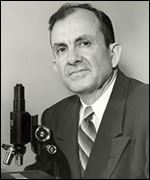 Dr. W. R. (William Rosier) Mathews was born in Alabama in 1895. He attended the University of Alabama and the University of Arkansas School of Medicine, where he specialized in pathology. In 1929, he was offered the position of chief pathologist at the Shreveport Charity Hospital, a position he would hold for over forty years. Dr. Mathews was much more than a gifted pathologist; he was also a well-respected educator. He trained residents and interns in the hospital, and when the School of Medicine was established, he trained the medical students, as well. He served as a mentor to many and was affectionately known as “The Boss.” Dr. W. R. (William Rosier) Mathews was born in Alabama in 1895. He attended the University of Alabama and the University of Arkansas School of Medicine, where he specialized in pathology. In 1929, he was offered the position of chief pathologist at the Shreveport Charity Hospital, a position he would hold for over forty years. Dr. Mathews was much more than a gifted pathologist; he was also a well-respected educator. He trained residents and interns in the hospital, and when the School of Medicine was established, he trained the medical students, as well. He served as a mentor to many and was affectionately known as “The Boss.”
In 1958, members of the Resident Staff at Confederate Memorial Medical Center established the W.R. Mathews Lectureship in appreciation of the many contributions he had made to the medical community. The first lecture was presented on June 19, 1958 by pathologist Hans Popper, M.D., Ph.D., from The Mount Sinai Hospital in New York. Dr. Popper, who later established the Mount Sinai School of Medicine, was a renowned authority on liver disease and was known as the Father of Modern Hepatology.
The Lectureship continued for almost ten years featuring a number of renowned physicians, including Alton Ochsner, M.D., who is the founder of the Ochsner Health System in southern Louisiana. Unfortunately, Dr. Mathews was quite modest and requested that the program be terminated. The last lecture was presented in 1967. He retired just a few years later in 1971 as Emeritus Professor. After his death in 1980, the Department of Pathology resumed the Mathews Lectureship in 1981, and the program continues today. A Professorship has been established in Dr. Mathews’ honor, as well.
For more information and images, click here.
In this 1979 interview, Dr. Leonard Goldman and Dr. Holoubek discuss Dr. Mathews. |
| |
| |
George R. Meneely, M.D. (1911 – 1987)
A Founder of the LSU School of Medicine in Shreveport |
| |
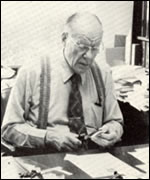 Dr. George Meneely was born in Hempstead, New York in 1911. He completed his undergraduate studies at Princeton University in 1933, and he graduated from Cornell University School of Medicine in 1937. He served as a faculty member briefly at the Louisiana State University School of Medicine in New Orleans from 1941 to 1943. Then, he joined the faculty at Vanderbilt University School of Medicine in 1943, where he became the Director of Nuclear Medicine and Biophysics and the Director of the Clinical Radioisotope Center. After leaving Vanderbilt in 1962, he eventually joined the faculty at M.D. Anderson Hospital and Tumor Institute in Houston and returned to the LSU School of Medicine in New Orleans as a Visiting Professor of Medicine. Dr. George Meneely was born in Hempstead, New York in 1911. He completed his undergraduate studies at Princeton University in 1933, and he graduated from Cornell University School of Medicine in 1937. He served as a faculty member briefly at the Louisiana State University School of Medicine in New Orleans from 1941 to 1943. Then, he joined the faculty at Vanderbilt University School of Medicine in 1943, where he became the Director of Nuclear Medicine and Biophysics and the Director of the Clinical Radioisotope Center. After leaving Vanderbilt in 1962, he eventually joined the faculty at M.D. Anderson Hospital and Tumor Institute in Houston and returned to the LSU School of Medicine in New Orleans as a Visiting Professor of Medicine.
Considering his extensive background in medical education, Dr. Meneely was appointed to coordinate the activities involved in the establishment of the new medical school in Shreveport in 1966. Soon after, he was officially designated as Professor of Medicine and Associate Dean of the LSU School of Medicine in Shreveport. In 1969, he was appointed as the first department head of the Physiology and Biophysics Department. He retired from the LSU School of Medicine on July 1, 1982. |
| |
|
 |
|